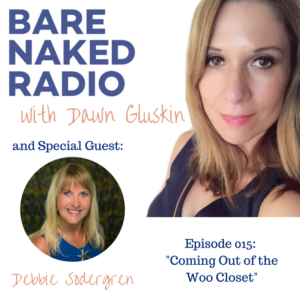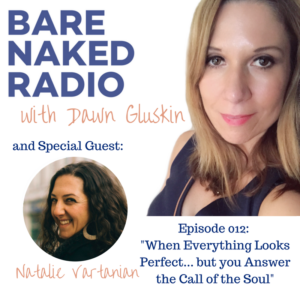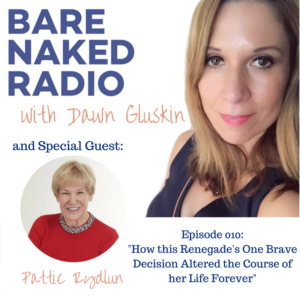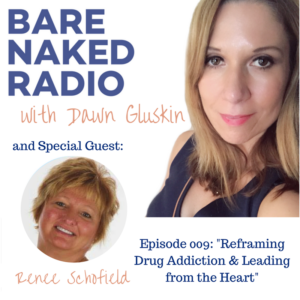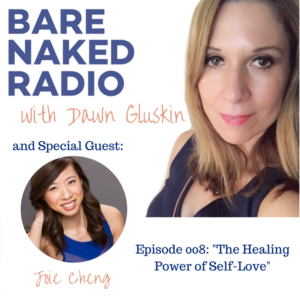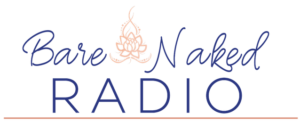
Episode 014: Leigh Daniel: Bringing Love to Law
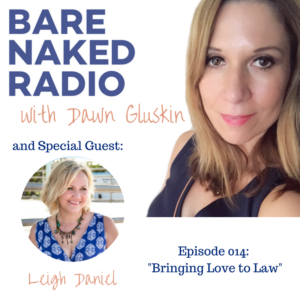
Listen to the episode and access the show notes here.
Dawn Gluskin: Hello and welcome back to another episode of Bare Naked Radio. I am your host, Dawn Gluskin, and today I’m excited to welcome a positive changemaker and lovely human being by the name of Leigh Daniel to the show.
Leigh Daniel: Hey there everybody and thank you, Dawn, so much for having me today.
Dawn Gluskin: Oh, it’s my pleasure. Leigh came highly recommended by a wonderful friend of mine, Debbie Sodergren, and we just talked a bit before the show. She’s lovely and I cannot wait to talk to her. She’s got a really interesting background and you guys are gonna love her. Leigh had been practicing as a family lawyer for almost 20 years when she realized the energy and stress was taking a toll on her. She had looked for another way and found Mike Dooley’s Infinite Possibilities. After becoming a certified as a trainer, she came home and transformed her law practice and her life. She’s gone on to create Project Positive Change, a global network of heart-centered entrepreneurs. I would just love to dive right into your story so the audience can get a feel of who you are and what you stand for. If you could just take us back a little bit – so you’re working as an attorney, which we all know can be a very stressful job, 80 hours a week. And something inside of you said, “You know, I need a way out.”
Leigh Daniel: I didn’t realize it at the time because I didn’t know that much about energy and things like that. Being a divorce lawyer, I would get really engrossed in what was going on with my cases. Being in that negative energy all day long, five days a week, I didn’t realize how it was affecting me. My health was taking a toll, I would eat a ton to processed cheese. Velveeta was like my food choice. A big block of Velveeta cheese. I know it sounds silly, but I was so unhappy. Even though it looked like on the outside that I had everything going for me – I had my practice, it was very successful, known as a very super mean lawyer.
Dawn Gluskin: Which I can’t believe. You seem so nice.
Leigh Daniel: Somebody said to me yesterday, “But she looks really nice.” They were, like, “Oh no, the courtroom.”
Dawn Gluskin: It’s game on in the courtroom.
Leigh Daniel: Yeah, it’s fortunate. I just knew that I was really unhappy. I had high blood pressure and my actual physician referred me to a spiritual counselor and she got me looking around at different things on the Internet and I happened to run across Mike Dooley on a Mindvalley newsletter. After I went to Mike’s event, everything changed for me from that point on.
Dawn Gluskin: What was it about his event or about his teachings that resonated with you? What was sort of your A-ha moment?
Leigh Daniel: Well, the biggest one was – well, if any of you that might be listening are not into this woo-woo – I mean, I showed up and was absolutely terrified, about all the happy people, I thought, “What? It’s not even 9:00 in the morning. ”
Dawn Gluskin: “Why are these people so happy?”
Leigh Daniel: “Why are they happy? Why are they all wearing so many bracelets.” I came to realize that the more spiritual you are, more bracelets you have.
Dawn Gluskin: I definitely fit that, though!
Leigh Daniel: I was feeling so out of sorts and so out of place. I kept running back to my room to hide between breaks. But on the second day, I wasn’t paying that much attention, but Mike said something like, “You can keep going to therapist or you keep taking medicine or maybe you could just decide to stand up and be happy.” And I thought, “Wow, I’ve wasted a lot of money, first of all.” I absolutely have nothing against therapists or drugs. But I just thought, “Is it really that simple?” I went back to my room and I just felt like shaken. “Is that true?” So when I came back, I brought my staff in and I said, “We are doing something differently. We’re going to be a law firm based on love. But we didn’t. We’ve managed to transform the way we practice law from that point onward.
Dawn Gluskin: What does that look like, bringing love to law? What did that look like for you guys?
Leigh Daniel: The very first step was really reframing everything that happened because there’s so much negativity here that I had to not only reframe for us – let’s just say there’s a hostile lawyer and I’ll say, “What can we say nice about them?” And it might be something like, “They dress really well. They’re very well spoken” instead of cursing them or thinking, “Oh, they ruined our day, what a horrible person they are.” Just a continual reframing from the negative to the positive. Then I had to do that with my clients as well because you can really, especially in the family situation, you can get so stuck on everything that’s going wrong.
Dawn Gluskin: Yeah. Attorneys are known for being cutthroat. The best ones are. The more cutthroat you are, the better your results are. It seems such a strange place to bring love. Bringing love into the battle field.
Leigh Daniel: I was very conflicted at times. I remember once I had a case with a cross-dresser. I was cross-examining him. He and his lawyer were just glaring at me and I didn’t care how many dresses he wore. I was doing my job to bring it up to the court. I really was thinking, “How can I attack this man? I feel like I’m judging him.” I felt so horrible. But then I learned that if I could just come from a place of intending just to show the truth rather than intending to attack – It’s really about intention, you know what I mean, Dawn? It’s the intention that I put behind what I’m doing. Do I have compassion? I am really showing the truth? Or am I really there trying to destroy somebody?
Dawn Gluskin: That’s a great reframe because as a lawyer, your job is to let the truth come to the table and then let the courtroom decide. It’s not personal and it’s not about attacking – acknowledging that there is a human being on that stand. Instead of making it personal. That probably is helpful to you too, I’m sure. A lot of those feelings of stress and happiness you had felt prior or because of the nature of that work.
Leigh Daniel: Yeah, for sure. You can’t be that miserable and stuck in that much negativity and not be affected.
Dawn Gluskin: Yeah. And then enters the Velveeta.
Leigh Daniel: The Velveeta, the bottle of wine. I also have a couple of pigs at home. It was a really difficult time. I think that this happens to a lot of people. I got to a point in my career that I thought, “Is this is really it? I make six figures or more, I can do anything I want, but why am I so unhappy?”
Dawn Gluskin: So many people can relate to that. The outside looking in, you have the perfect life, everything’s great. Then you’re like, “What’s wrong with me? Why am I not happy?” What was the answer that you came up with for yourself?
Leigh Daniel: I found that I could just create whatever I wanted. If I wanted to keep creating misery, I could keep creating it. If I wanted to create something different, I had to think about something different. And Mike’s Dooley’s thing that he says is “Thoughts become things.” I really started putting that into practice and thinking about what I’m thinking about. But I just looking at my thoughts and seeing how am I approaching things? I stopped calling a client, spouses – like they really want you to call other person a name. Like, “What about this person? They’re so so and so.” I had to just keep pointing them away rather than getting engaged in calling them names or say, “You know what, let’s look at this from a different perspective of…” or “Why don’t we look at what’s going to happen in the future that’s great rather than all the bad things that happened in the past.”
Dawn Gluskin: It sounds like your role almost evolved from not just being the attorney and trying to win the case, but also almost like a counselor and then helping them heal. Is that kind of how it occurred at times?And
Leigh Daniel: Sort of. Yeah. I also have a huge community of people that I do referrals, I send lots of people referrals for coaches and therapists and things like that. But really, just having them stop looking at all the bad and just focus on those little good things that they can find in their life. Maybe they are upset because, “I’m not going to see my kids every day” and I say, “Well, but what if you have more quality time with the kids when you see them?” I just kinda keep directing them back to that space.
Dawn Gluskin: I love it. I love it. For those who laughed at you and said, “We’re going to go out of business when you bring love to law.” You’re still thriving. How has it affected your bottom line?
Leigh Daniel: At one point – I think it was around maybe around six or seven months later – I definitely was at a crossroads where I could tell people would come in and they wouldn’t hire me. That had never happened before. I thought, “What’s happening?” This one really negative woman – the sky was falling. Literally she parked in front of the offices and a tree fell on her car. Everything that was bad would happen. She fired me and I thought, “Oh my gosh, it was a big money client.” And I won her first case, this was her second case. I thought, “But I didn’t want to represent her.” After that, I started really thinking about the person I wanted to attract into my practice. We’re far more successful now than we were then. So it hasn’t effected my bottom line at all.
Dawn Gluskin: It seems it’s affected it positively and you’re getting the clients that you want to work with. Which is beautiful. That’s just like doing the work that you love, working with people that you want to work with. I mean that sounds like a perfect ending.
Leigh Daniel: My website has positive change all over it and Buddhas all over the office. I think if they walk in or they looked me up online at all, they’re going to see that my platform is about being positive, bringing positive change into their lives. That’s all I talk about. That doesn’t make me any less of a competent or tough lawyer. It just means that I do my job and I do it from a place of respect for the other people.
Dawn Gluskin: That’s such a great point because you can still do your job effectively, like you said, uncover the truth, makes sure that justice prevails. But you don’t have to bring on the dark energy. You don’t have to attack people. It’s like you can do it in a way with integrity. We often talk on Bare Naked Radio about being the truth of who you are and how we’re so afraid to be who we really are because we’re going to be judged. Or in your case it’s like, “Well, you’re a lawyer, you’re supposed to show up a certain way. Not with Buddhas all over the office, not talking about positive change.” There’s a fear of like, “I’m going to lose clients”, but you’re going to lose the clients you don’t want, which is a good thing. You’re going to attract the ones that you do want and the people that you most want to work with.
Leigh Daniel: Also the people that come to me are satisfied because no matter how their case turns out, they know that I’m really giving them more than just legal advice. I’m giving them love. At this office, that’s what we do. Everybody that works for me, I indoctrinating them into the idea. I’ve looked for people to work for me that come from a space of compassion and really wanting to give back. That’s just become what we are here.
Dawn Gluskin: It’s beautiful. Often in the show we often talk about your biggest failures, quote unquote, because I don’t believe there’s any true failures. Just learning experiences or biggest fears. And talking about that, you had talked about when you first started speaking and doing workshops and then you were getting some negative feedback from other attorneys. They caused you to question yourself.
Leigh Daniel: I get negative feedback from other lawyers because they say that I’m too happy.
Dawn Gluskin: They need to go to Mike Dooley’s event. Right? Like you. To realize, “It’s okay to be happy.”
Leigh Daniel: It’s our natural state is to be happy. I can recall a trial where I had just gone to lunch with my client and I was feeling pretty good. It was just a case about money. There weren’t any children or any domestic abuse. There’s nothing heavy duty about the case. It was just a money case and they both had money. The other lawyer says, “Objection, Your Honor.” I’m like, “What is she objecting to?” And she said she was objecting because Miss Daniel is smiling.
Dawn Gluskin: There’s no smiling in the court room!
Leigh Daniel: No, evidently not. And I said, “What?” And she said, “She’s been smiling at the court reporter the entire time.” She’s sitting across from me! I had to go into the judge’s chambers. I had to go explain that I taught people happiness and then I was pretty good at it obviously.
Dawn Gluskin: Wow. I mean that really paints the picture of what the atmosphere is like in a court room. You’re smiling. Just being a happy, normal person smiling at another human being that you get called into the judge’s chamber to be reprimanded.
Leigh Daniel: The judge wasn’t mad at me, but it was just kind of – I think they all know now. One lawyer says a little song, “Happy, happy, happy.” I’m like, “Yeah, yeah, whatever.” But I think they are used to it now. There’s not a lot of smiling in court room.
Dawn Gluskin: You’re just going to show up as who you are and you’re probably way happier. Have way less stress levels. Living a richer life than the average attorney because of what you’ve gotten turned on to. Then tell us: you came home after your transformation, becoming one of the happy people. I do have to ask now: do you wear the bracelets?
Leigh Daniel: I have many more bracelets now. Many many more.
Dawn Gluskin: I love it. I love it. Then you went on to create Project Positive Change. Tell us about the project and how it took off and where you guys are right now.
Leigh Daniel: After I found out that life could be different, I was really on fire to teach more people. I went and coached or taught hundred people out of Mike Dooley’s book and his workbook. That was first. Then I started doing retreats in Key West, Florida. I did nine successful retreats there and I met so many people. I started writing on a Facebook group, “We share infinite possibilities.” I met tons of people who wanted to make a difference in the world and we didn’t know how to do it. It was so expensive to get started doing online marketing. Lots of us had other jobs. So I said, “What if we just formed this community and started helping each other?” So that’s what I did. It’s been almost three years. April 1st was my very first webinar. The first people that joined, I thought, “I can’t believe you guys are joining. I just have an idea.” Soon, we set our goal for 111 people and that’s how many joined by mid-July. It was pretty incredible. All of us have a common goal to do business in a different way. That is to really put service to the world first and we want to make money and we will make money, but it’s not just about the bottom line. It’s about creating purpose in our lives and creating purpose in our business.
Dawn Gluskin: If you can create service to the world first and happiness inside a courtroom, which isn’t usually service to self and not happiness, but competition. If you can create that there, then yes, you can create that across any industry.
Leigh Daniel: I remember I used to read Marianne Williamson and she wrote in “A Return to Love” that when she used to work as a waitress in New York City that everybody else just thought she was a waitress. She knew she was a lightworker. I really think that’s all of our roles as light workers in whatever, wherever we are, whatever we’re doing, if we can just bring that higher consciousness and that higher vibration to wherever we are – we’re shifting things just a little bit,
Dawn Gluskin: Yeah, because our light and our consciousness – that’s the truth of who we are at the core of our being. And then we forget. Life happens and we start building up all these layers and all these beliefs and then we just forget who we are. Especially when you get sucked into some of the more corporate, cutthroat environments – like practicing law especially as a great example of that – then you lose sight of that so easily. But it’s not that hard to bring it back. Right? What would you recommend to people listening that are saying, “I want more light in my life?”
Leigh Daniel: I say start with the littlest step of reframing. Just catching what you say first because that’s pretty easy. What do you say about yourself? What do you say about your neighbors? When I first came back I had to kind of cut ties with lots of people that were negative in my life. While I thought, “Well shoot, I’m not going to have any friends.” Now, I had a community of hundreds of people who support and love me, but I didn’t want to be around people who are gossipy or who backbiting or competing. I just cut that out of my life.
Dawn Gluskin: That’s such a beautiful point for all of our listeners too. Sometimes we’re afraid just to be who we really are or to step into our light or step into our power because we’re afraid of losing people. But sometimes you do lose those clients that aren’t aligned or sometimes you do lose those friends that aren’t in alignment. It’s okay because when you lose the people that aren’t your people, that aren’t in alignment with you, the right people can come into your life. You’re creating actually creating space for more abundance, for more joy.
Leigh Daniel: I remember going to dinner with a group of women. They said, “We missed you, blah, blah, blah.” I sat there and listened to them all talk about other women and I thought, “I don’t want to be here. I don’t want to do this. I don’t want to talk about people. I want to lift people up.” I know there’s some things you can’t avoid. I certainly can’t avoid going to court everyday and it sure as heck didn’t feel good all the time, most of the time. But if you can choose and you’re in a place that you don’t feel good, then don’t stay there. We have a choice to choose something that lifts us up and makes us feel great or something that makes us feel bad.
Dawn Gluskin: It is something that you have to do, like going to the court room. You can find a way to make it. How do you bring your light into that situation?
Leigh Daniel: Oh my goodness. I started wearing crystals in my bra. I did a little Reiki before going into the courtroom. I just say whatever it is I want to manifest that day. Recently at a trial and the whole way there, about an hour and a half. I just said, “I’m love and I am fairness and I am…” I just kept saying affirmations. I set my intention to do the best I could. It was the most incredible feeling of calm competency, skill – it’s just about setting intention.
Dawn Gluskin: It’s such a great role model for some people because a lot of times people will be maybe stuck in a job that they don’t love and there’s another calling for them. They’re like, “Well, how do I do both? I can’t quit my job because I still need the income. I’m not in a place to do that yet. Or maybe I don’t want to for other reasons. And I have this calling, this passion to do something else, like a soul calling.” It sounds like you’ve got the best of both worlds. You’re bringing love into the courtroom and you have your project, Project Positive Change. How do you manage it all? Do you just work constantly?
Leigh Daniel: I work a lot but I have a great team. I have a team of people with Project Positive Change. I have a team of people in my law office. I just surround myself with people that have the same vision that I have and know what the end result is which is to make, especially in my domestic practice, to make them leave in a better place than they were when they started. Just financially or not just with their children actually to have a piece of hope.
Dawn Gluskin: It sounds like you’re really invested in your team and helping them transform. If they come to work with you, they’re going to get uplifted and you guys are going to grow together.
Leigh Daniel: I’ve hired two lawyers since that happened and I fired one guy too because he was really angry and negative. I just said, “I can’t have you acting like that.” The people that I’ve hired are positive. They can see that silver lining, they really care about the people that come into the office. They’re not just a file. They’re not just money. It really means something.
Dawn Gluskin: It’s beautiful because in the business world, sometimes we can forget we’re working with humans. It’s not just a number on a spreadsheet. Those are real people with real feelings with real lives.
Leigh Daniel: Right. And I recently spoke at an event in the UK to about a hundred women. I had a very successful law practice and I was sharing that by even showing some vulnerability, showing your clients that you’re a real person, telling them anecdotes, connecting with them. That’s why I find that I’ve been so successful. Somebody wrote a comment that I had shown her a way to do business that she never thought of before.
Dawn Gluskin: That’s such a great point because a lot of people correlate vulnerability with weakness. It’s, like, “Being vulnerable, I’m opening up, you can hurt me now, I’m opening myself up to it.” But you actually find strength in vulnerability, which is how I view it too.
Leigh Daniel: And the other people that are around you – that enables them to show themselves as well. Right? My dog comes to work with me, that helps a lot.
Dawn Gluskin: Just the dog? Not the pig?
Leigh Daniel: No, the pigs are too big! One of my dogs comes here and I have lavender oil on. The people that especially stressed, I’ll get the lavender out. It just makes everybody feel like there’s a lot at the end of that tunnel.
Dawn Gluskin: Yeah. Well you sound like you’re doing it right. You’ve got lavender oil, you got the dog, you’ve got the Buddhas, we got the crystals and the Reiki. I’m like, “I want to go to your law office because that’s where it’s going on.”
Leigh Daniel: Well, you don’t! Dawn, you don’t want to come here. This is where people get divorced.
Dawn Gluskin: That is true. I just want to come hang out.
Leigh Daniel: I just bought a farm as well. I’m so excited about my new farm
Dawn Gluskin: Aw, I love it. So how did you end up with the pig and the farm?
Leigh Daniel: Well, the pig lives actually in the city. So hopefully nobody that works for the city is going to be listening today. I call him my “Hot Piggy In The City”. I had a picture of a pig over my bed like an artpiece, with a pig lounging on a couch for years. And then I had another picture in my kitchen of a pig. When I went to this flea market one day, I didn’t go with the idea about a pig, but I’m pretty sure that having those pigs in my house are exactly why I ended up with a pig. He’s a lovely guy.
Dawn Gluskin: Impulsively you’re like, “I’m buying a pig today.” It was meant to be.
Leigh Daniel: I’m like, “Let’s just take this hog home.”
Dawn Gluskin: Wow. I love it. Why not, right?
Leigh Daniel: Exactly.
Dawn Gluskin: Well, you have been such a joy to talk to you. Of course the show always goes by so fast, but we’re coming to that time in the show – our listeners who are loving you and your energy and they want to find out more about the Positive Change Project – how do they get in touch with you on social media, on the web. Where can they go next?
Leigh Daniel: Thank you, Dawn, for asking. We have a really great Facebook page called Project Positive Change. On the page I have 180 members from 25 countries and we have all kinds of videos helping people with so many different things, from their pets to their careers to Akashic Record readings, intuitive readings. You can check us out on Facebook, Project Positive Change. We have a website, projectpositivechange.com You can reach out to me on social media, Just send me a Facebook message or find me at my Facebook group: “We Share Infinite Possibilities.”
Dawn Gluskin: And all of those links will be up on barenakedradio.com in the show notes under Leigh Daniel’s podcast episode. If you can bring positive change and light and happiness to a courtroom, then you can bring it to anywhere in life. Thank you for demonstrating that and just showing people how it can be done. And I love your spirit and love you and thank you so much for being on the show today.
Leigh Daniel: Thank you so much for having me.
Dawn Gluskin: It’s my pleasure.
Listen to the episode and access the show notes here.

